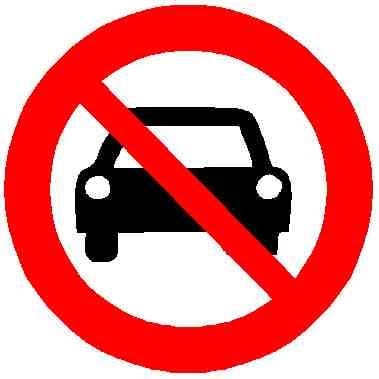

No, it’s because they are particularly dangerous to children.
If you peruse statistics of pedestrian deaths, you will find both children and seniors are the most frequent victims. Look it up.


No, it’s because they are particularly dangerous to children.
If you peruse statistics of pedestrian deaths, you will find both children and seniors are the most frequent victims. Look it up.


Hey, hey! That’s an unfair take. They also kill adults, seniors in particular.


It is called the “unmatched count technique” or “list experiment.” It has a wider error range, so you need to poll more people, but you get honest answers.


Where do bikes fit in your overall design?


I can lend money to others without them as middlemen
Private banks are highly regulated businesses to avoid fraud and maintain the trust and stability of the financial system. They also play a key role in the creation of money supply. Banks literally create money when they issue a loan, something no other business can do.
and at the same time they seem to suggest that having money in banks is not risk-free
Because it isn’t 100% risk free: your bank can default and if your cash balance exceeds the amount that is insured by the government you can lose that excess.
The central bank cannot go bankrupt because it issues its own currency. You could experience the effects of inflation, but you would be protected from bankruptcy.
That’s why authorities are concerned about allowing citizens to hold their savings in central bank accounts.


You mean mixing businesses and residential units in the same walkable neighborhood like we’ve done for thousands of years? That would never work! We must maximize commuting distances in order to reduce traffic and commuting times.


Bugs gone in two days represents the experience of the only two independent instances where people I know had to deal with bedbugs. Your experience may be different and I respect that.
In both instances the professionals wanted to spray insecticide as I described, too.
No offense
L-O-L
☮️✌️


You do you. A professional will ask you to move all your furniture, spray insecticide everywhere, come back two weeks later to repeat the same process again to kill the newly hatched eggs, and tell you that it is quite likely that the bugs will come back, so further rounds may be needed.
Diatomaceous earth pops up on every discussion because it works. Bugs gone in a couple of days, because D.E. sticks around to kill any larvae that hatch over the following weeks.


Diatomaceous earth kills the little bastards and it is non-hazardous to humans, as long as you don’t snort the stuff.
Apparently for them is like walking on broken glass and they bleed do death, so to speak.
My sister had an infestation long ago and it was very effective. You can find the stuff online easily.


Nobody designed them the way they are, at least not with a grand design in mind. Traffic is shaped by planning for existing demand
That is not how it works, at all. They model future demand and they do make executive decisions to shape traffic in the way they want it to be, not just the way it is today.
as long as you don’t have a credible idea why millions of people should give up their homes to live in overpriced shoe boxes without a bit of green and quiet in the city, this will get you nowhere
That is happening because:
People love living in spaceous houses they own.
They don’t love it so much when they have to pay for the cost of the infrastructure needed to support them. Stop subsidizing suburbs and suddenly people will be much more accepting of more modest accommodations, like most of us do.
Remember that those urban centers would and could simply not exist without people from the outskirts working and shopping in those urban centers.
Plainly false, as those suburbanites could simply move closer to where they work, if only zoning laws permitted them to do so, which is not the case in most of North America.
Again, and it is a point that no amount of mental yoga can get around: what we want is something that already happens in plenty of towns around Europe and Japan that existed before the advent of the car. It is not unrealistic, it is the historical norm.


This is the key worry of governments with cryptocurrencies, and was the main selling point of them initially, before the whole crypto tech bro hype.
Yep. Arguably Bitcoin arose from the 2008 financial crisis and the following bailouts.
What I’ve never understood about it is that it seems so unlikely that it would ever replace a national currency, for two simple reasons. First, because taxes owed in a country can only be repaid in the national currency. Second, because government contracts will only ever pay in the national currency, from macroprojects, to maintenance contracts, to millions of civil servants. This creates both a ton of demand and a ton of supply for the national currency.
And that doesn’t even take into account the role of the central bank and private banks in the money supply. Being highly regulated, there’s zero chance that a private currency would ever be legally allowed to take hold there either.
Central bank digital currencies appear to have very little to do with crypto currencies like Bitcoin. Rather, they appear to be a mechanism to surgically induce economic stimulus when and where desired, like a more controlled version of the stimulus checks that we saw in many countries during COVID.
For example, they could directly credit your digital currency account with a certain amount of money that you are only allowed to spend on certain goods and services and for a limited amount of time. This would ensure that the money is spent and stimulates certain economic aress rather than being hoarded or invested.


I spent a couple of decades living in Spain. I’m well familiar with old towns.
Designing our streets for pedestrians first, transit/bikes next and private motor vehicles last is the way it should be. If that means that some streets are inconvenient for car traffic, so be it. Surely that is preferable to downgrading the ability of the most vulnerable to move around, or the quality of that experience.
North-american style car-dependent suburbs are an aberration that should disappear altogether. They didn’t exist a hundred years ago and they shouldn’t exist now. It is immoral that the people living sustainably in urban centers are subsidizing the people living at large in the suburbs. If they like them so much they can pay their true cost to society.


I just made it clear that making personal cars somehow “vanish” will not really change the financial side of things.
What you are not taking into account is that the sort of low-density, car-dependent, single family home suburbia we criticise requires many more square meters of road per person than a walkable medium-density mixed-use neighborhood. Strongtowns shows with data, not opinion, how town centers are subsidizing financially unsustainable car-dependent suburbia.
I wish anyone in this “FuckCars” community would actually think of a way to fix the world, and not just complain about the way it is.
Easy. Start by copying the Dutch street design guidelines and zoning laws. Boom! Living car-free or car-lite would be much easier, at least in North America where so many people drive to do the most basic daily errands.
We don’t need to reinvent the wheel, just study and copy what already works elsewhere. That’s how bad things are around here.


Please stop being disingenuous. You know perfectly well that what we want is doable because it is already being done in many places in Europe and Japan. Stop fighting a strawman of your own creation.
We want fewer private motor vehicles in our streets because car-centric urban planning translates into places that are unpleasant to live in, especially for people who don’t drive.
I live right by a busy stroad. How many of the cars whizzing by do you think are delivery vehicles? How many busses? Very few compared to the number obese SUVs and lifted pickups, even though there are four large supermarkets and many shops within walking distance along this corridor.
If we reduced the number of private motor vehicles in this stroad the quality of life for my family would significantly increase: less air pollution, less traffic noise, more pleasant daily errands, less risk of being run over by a tank-sized ego booster, more room for trees and bicycles.
Stop spewing bullshit and fear. Let my kids and I hope for a better future.


Until people develop a workable alternative
The alternative will not appear out of thin air. More people need to have a sense of the long-reaching consequences of car-dependent urban planning and that’s what propels them to vote for better planning in their cities.
Nothing is going to change without a shift in political leanings, and that’s what this sort of advocacy is doing.


“Nothing happened! See, it is not such a big deal.”
Somebody who doesn’t understand that the effect is cumulative. Just like a heavy rainstorm one day may be manageable but if it happens every day you have a flood.
We need to do better.


in theory a lot or europeans are still living comfortably off of the horrific crimes they committed
in practice i doubt this money would come from those most responsible
A few Europeans from a few countries committed horrific crimes over half a century ago. Leopold III of Belgium in the 1950s during the independence of the Congo being the most modern example I’m aware of, and he died forty years ago.
If we are talking about the slave trade bound to the US, that ended a century and a half ago. Not that things turned instantly great for the freed slaves, of course.
So how much should we chastize people who were not even born when these things happened, and how much reparation needs to be paid to people who were not even born when it happened either? Because the way things work in the real world, I fear that in the end it will be middle class folks who will be paying “reparations” that will do nothing but fill the pockets of a few corrupt politicians from the receiving countries.


the dockless rent-a-scooters need to go
Yeah, I get it. Private vehicles everywhere on the side of the street are an eyesore and take a ton of valuable public space. If at least e-scooters were as small as a car it wouldn’t be such a big deal to see them parked everywhere.


Plus, some people have kids under 5
Yup, that’s us. We walk, use transit, or the kid rides on her bike child seat.
E-bikes exist if you don’t have the legs to tackle those hills yet.
News like these are the reason why I don’t visit authoritarian or corrupt countries. Well, that and because I’m broke.